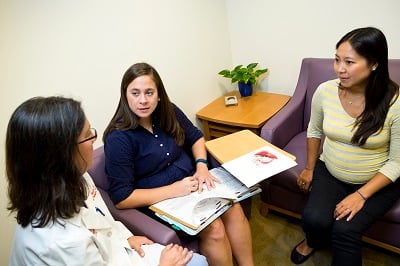


The Zickler Family Prenatal Pediatrics Institute at Children’s National Hospital provides the most advanced and comprehensive prenatal pediatric care for unborn babies. We offer pregnant families state-of-the-art prenatal diagnostics and treatment in a compassionate and supportive environment.
Our multidisciplinary team knows the critical importance of care continuity across each individual patient’s journey. We work to ensure that you receive the most accurate diagnosis and care planning, while providing information on topics like genetics and conditions that may affect your child. Our clinical care coordinators help families navigate their appointments and care, ensuring clear and compassionate communication between patients, their care team and referring providers from the very first contact through delivery of the baby and beyond.

The Prenatal Pediatrics Institute will:
- Partner with your referring provider. Our care coordinators and patient liaison keep your referring doctor informed of your baby’s diagnosis and anticipated treatment plan.
- Collaborate with providers in other specialties at Children's National. We partner with programs including the Turner Syndrome Clinic, which helps to support expectant parents who have received a prenatal diagnosis of the genetic condition seen in children who are missing all of part of an X chromosome.
- Keep in touch with you throughout your pregnancy. Our dedicated Prenatal Pediatrics liaison makes sure you are informed about the next steps in your baby’s care, and is always just a phone call away.
- Provide consistency in your care team. If your child will spend time in the Neonatal Intensive Care Unit or one of our specialized care programs, we’ll introduce you to the doctors and specialists who will be taking care of your baby in those areas before your delivery. We’ll also make sure you’re informed of our delivery planning and neonatal care services.
Prenatal Pediatrics
We begin caring for your baby before she or he is even born. Prenatal (during pregnancy) diagnosis helps us gather as much information as possible about your unborn baby. This allows us to create a comprehensive and personalized treatment plan to improve the long-term outcome of your child.
Our prenatal pediatrics experts in the Children’s National Hospital will be involved in your baby’s care during your pregnancy, as well as the newborn period and beyond. Learn about our high-risk prenatal services, genetic and prenatal counseling and Fetal Imaging Program below.
What is included in prenatal care?
What are high-risk prenatal services?
What are genetic and prenatal counseling?
What is the Fetal Imaging Program?
We're Here to Answer Your Questions
If you have questions or need more information about the Zickler Family Prenatal Pediatrics Institute, please call 202-476-7409 or email us.






